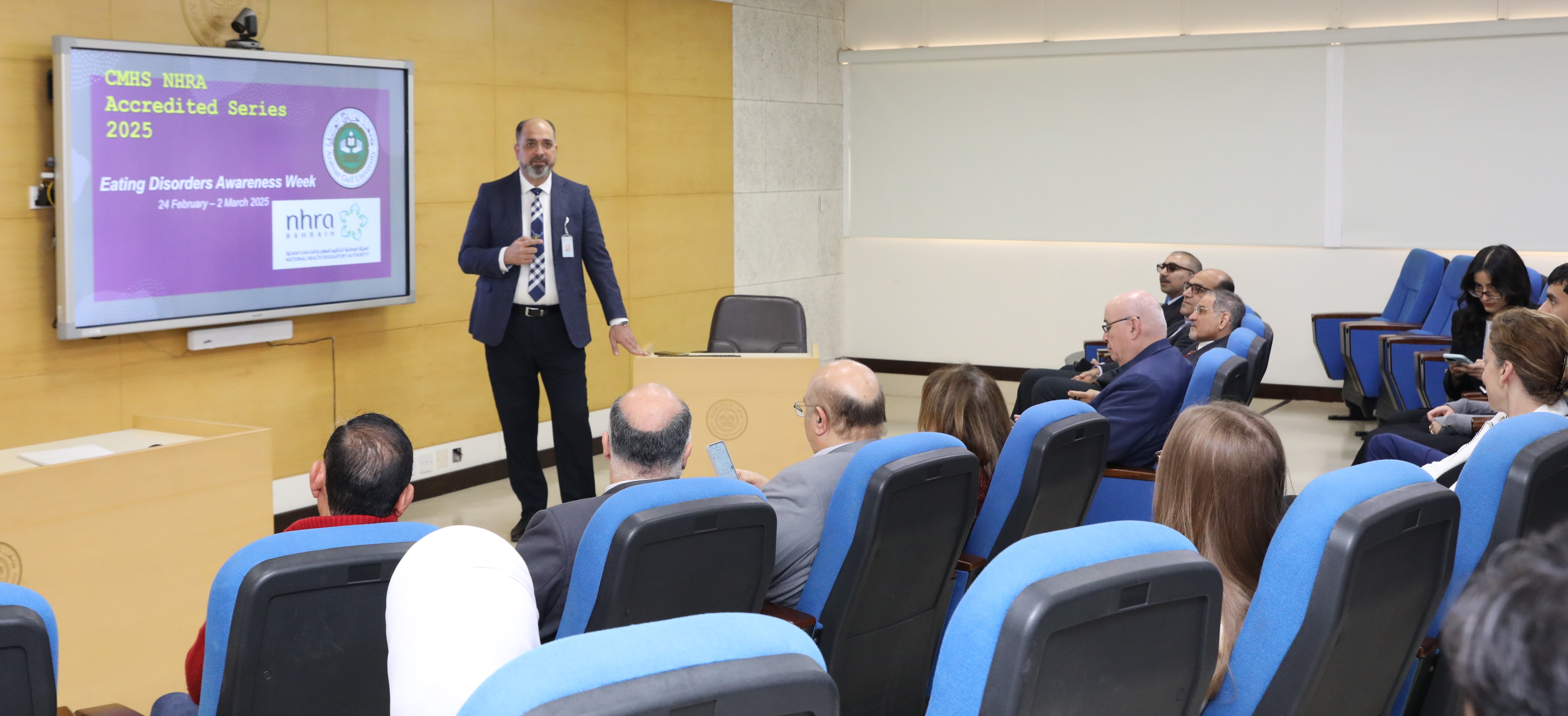
AGU Launches Initiative to Educate on Eating Disorders Amid Global Awareness Week
Arabian Gulf University
25 Feb, 2025
The College of Medicine and Health Sciences at the Arabian Gulf University (AGU) organised a workshop in alignment with the Awareness Week for Eating Disorders, which runs from February 24 to March 2. The workshop featured several specialists from the college and included participation from 30 attendees, including faculty members and students from the Medicine and Nursing programmes.
Attending the workshop were Dr Abdelhalim Abdelfattah Deifallah, Dean of College of Medicine and Medical Studies, Dr Rima Lutfi Abdulrazzaq, Dean of Graduate Studies and Scientific Research, and Dr Asil Al Saleh, Dean of Student Affairs; along with a representative from the World Health Organisation (WHO) in Bahrain.
During the workshop, Dr Tarik Al Shaibani, an associate professor in the AGU’s Department of Physiology, explained that studies related to eating disorders have shown a strong link between these disorders and psychological stress, emotions, and mood. He noted that psychological tensions and daily pressures can affect an individual's eating behaviour in two contradictory ways: either by causing them to refrain from eating or by leading them to eat excessively without control.
He added, “The gut-brain axis may play a pivotal role in eating disorders, operating in two directions: upward from the digestive system, particularly the intestines and colon, which influence neural pathways in the brain, potentially leading to changes in neurotransmitter release. The other direction is downward from the brain, especially from the centres of hunger and satiety, and their complex connections with other centres such as those related to pleasure and memory, which can impact the digestive system.”
In turn, Dr Haitham Jahrami, an assistant professor in the AGU’s Department of Psychiatry and a consultant psychiatrist, highlighted that the Eating Disorders Awareness Week stresses the urgent need to address eating and nutrition disorders as serious mental health conditions with profound physical, emotional, and social consequences. He pointed to the complexity of these disorders, including anorexia nervosa, bulimia nervosa, binge eating disorder, and less well-known conditions such as pica and rumination disorder.
Dr Jahrami warned of the widespread impact of eating and nutrition disorders, citing alarming statistics indicating that nearly 9% of the global population is affected, with anorexia nervosa alone leading to a mortality rate of up to 10%. He reviewed the multifaceted implications of eating disorders, including malnutrition, cardiovascular complications, anxiety, depression, and social isolation.
He affirmed that these disorders are not choices, but rather diseases influenced by biological and environmental factors, affecting people of all ages, genders, and backgrounds, with up to 35% of cases occurring in males. He underscored the importance of early detection through approved screening tools that help identify symptoms and guide intervention, stressing that recovery can be achieved with appropriate support through increased awareness.
In this context, Muneera Al Mahmeed, a student in the College of Medicine and Health Sciences of AGU, presented the results of a study aimed at assessing the prevalence of eating and nutrition disorders among students at the AGU, potential contributing factors, and the impact of the COVID-19 pandemic as an independent global stressor.
She explained that the study found that 32.1% of the tested students are at risk of developing eating and nutrition disorders, with those living in university or communal housing being less likely to experience these disorders, while preclinical students were more susceptible. One of the key findings of the study was that interaction with global stress factors was significantly associated with an increased risk of developing eating and nutrition disorders, deterioration in the condition of those at risk, and the emergence of complications.
